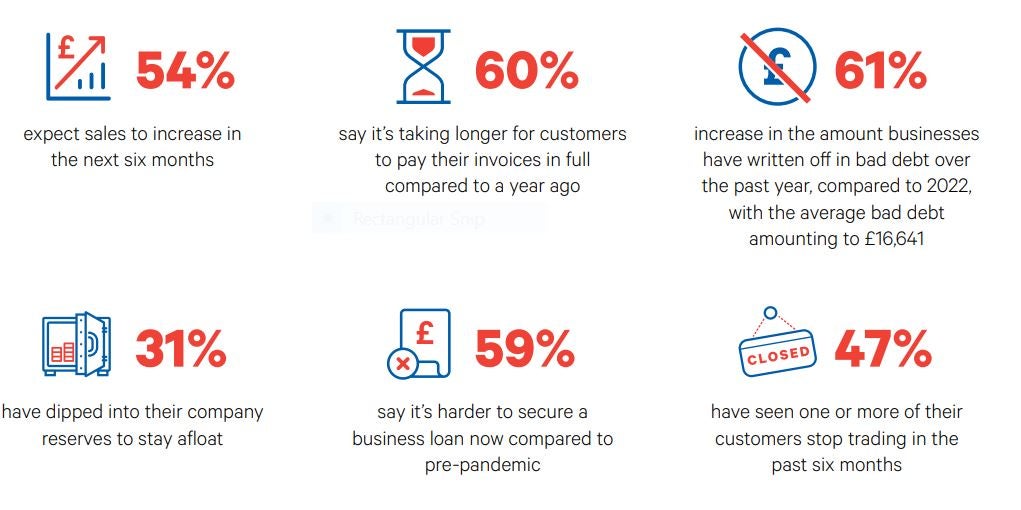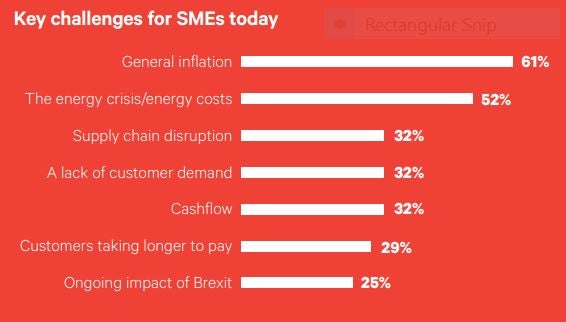The Bank of England recently increased the base rate to 5% which is the highest level since the 2008 financial crisis. Sean Neville (pictured), Managing Director of Bibby Leasing, says market insights about SMEs can offer a way forward in these challenging economic times.
It was clear that 2023 was not going to be an easy year, especially for small businesses. Over the last few years, and certainly in the first half of 2023, SMEs have been battling with a panoply of significant issues.

Inflation has remained sky-high, and interest rates have continued to climb. SMEs have also been impacted by challenges such as the rising cost of raw materials and energy prices, as well as stymied cashflow, compounded by rising bad debt levels and continued late payments.
Despite these challenges, UK SMEs have continued to show great resilience and ambition. And with the positive news that the UK has, thus far, avoided a recession, heading into the second half of the year presents an opportune moment for these businesses to step back, reflect, and prioritise their investment plans for the next six months and beyond.
Businesses of course experience different issues depending on the sector they operate in, but there are a number of things that should be considered for protection and success.
The cost of doing business is here to stay
June 2023 marked the Bank of England’s 13th consecutive interest rate rise, to 5%, the highest rate for 15 years. And as interest rates seem to be failing to adequately tame stubbornly high inflation, the rising cost of business and how to tackle it remains front of mind for small business owners.

US Tariffs are shifting - will you react or anticipate?
Don’t let policy changes catch you off guard. Stay proactive with real-time data and expert analysis.
By GlobalDataIn fact, our recent Q2 2023 SME Confidence Tracker found that inflation is keeping 61% of SME owners up at night, and nearly four in ten (39%) are worried they won’t be able to pay off their loans if interest rates go up further.
We know that unavoidable, escalating costs to businesses have been seen most acutely in rising energy charges and raw material costs – and experts have warned that energy costs may spike again this winter.
Although the current landscape is not the most positive, knowledge is power, and small businesses should continue to closely monitor inflation and interest rates in order to be aware of the situation as it develops. This will not only allow time for the planning of protection strategies but to also make decisions around growth and long-term capital investment as and when the time is right.
Overcoming cashflow challenges is key

As well as inflation and increased borrowing costs, rising levels of bad debt and late payments also pose great issues to SMEs’ cashflow. We found that there has been a 61% increase in the amount businesses have written off in bad debt over the past year compared to 2022, and 60% of UK SMEs say it’s taking longer for customers to pay their invoices in full compared to a year ago – highlighting the significance of the issue.
One solution to cashflow issues is securing funding. While it is encouraging to see that the UK treasury has launched an inquiry into the challenges faced by small businesses when seeking finance, much more needs to be done to actually increase SME access to this type of support.
Small business owners have many plates to spin and cannot be expected to be an expert in all financial matters. Therefore, it is a good idea to tap into external sources of expertise to receive best advice in finding the right funding or finance tools to unlock cashflow. And this isn’t just a quick fix solution – depending on a business’ needs, a finance package can be a long-term sustainable strategy allowing for operation optimisation, investment in assets, and ultimately, growth.

Unlocking growth and productivity
Small business productivity is a critical factor for the UK’s economic growth and competitiveness. However, ONS figures show that the UK was the only G7 country to see a fall in productivity following the pandemic.
Recent industrial action across a plethora of sectors has continued to impact overall UK productivity. But another major reason for this decline can be attributed to limited access to cashflow, which is preventing SMEs from investing in, upgrading, and growing their operations.
It is important that the confidence and productivity of UK SMEs is prioritised, and therefore we would welcome further financial and regulatory support for SMEs from the government. By fostering and enhancing innovation and entrepreneurship, we can continue to attract foreign investment in the UK and continue to drive forward economic growth.
2023 and beyond
While it is important to be optimistic about the future of our economy, it would be naive to assume that these challenges are going to cease anytime soon. It is vital that we continue to keep a pulse on the pressures that SMEs are experiencing, and work hard to help them to overcome these. SMEs, making up 99% of the economy, are the key to driving prosperity and growth in the UK.








